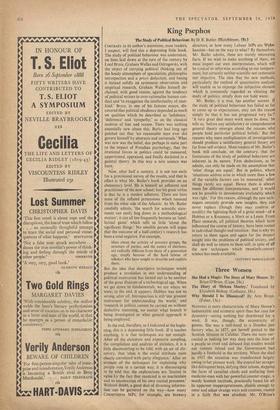King Psephos
The Study of Political Behaviour. By D. E. Butler. (Hutchinson, Its.) CONTRARY to its author's intentions, most readers, I suspect, will find this a depressing little book.
The study of political behaviour was undertaken, on lines laid down at the turn of the century by
Lord Bryce, Graham Wallas and Ostrogorski, with the object of carrying political thinking out of the heady atmosphere of speculation, philosophic introspection and a priori deduction, and basing it instead solidly on systematic observation and empirical research. Graham Wallas himself de- claimed, with good reason, against the tendency of political writers to over-rationalise human con- duct and `to exaggerate the intellectuality of man- kind.' Bryce, in one of his famous essays, dis- covered that political obedience depended as much on qualities which he described as 'indolence,' `deference' and 'sympathy,' as on the classical motives of fear and reason. There was nothing essentially new about this. Burke had long ago pointed out that 'no reasonable man ever did govern himself by abstracts and universals.' What was new was the belief, due perhaps in some part to the impact of Freudian psychology, that the irrational forces in politics could be measured, apportioned, appraised, and finally docketed in a general theory. In this way a new science was born.
Now, after half a century, it is not too early for a provisional survey of the results, and that in effect is what Mr. Butler's book provides on an elementary level. He is himself an adherent and practitioner of the new school; but his great virtue is that he is a modest adherent. There are here none of the inflated pretensions which resound from the other side of the Atlantic. As Mr. Butler candidly admits, 'the search for scientific state- ments can easily bog down in a methodological morass'; it can all too frequently become an 'intel- lectual game' which tells us little 'about the significant things.' No sensible person will argue that the outcome of a half-century's research has been a total negative. For example, ideas about the activity of pressure groups, the structure of parties, and the nature of elections, are radically different from those of a generation ago, simply because of the hard labour of scholars who have sought to describe and explain them.
But the idea that descriptive techniques would produce a revolution in our understanding of political motivation has turned out to be another of the great illusions of a technological age. When we get down to fundamentals, we are where we were; in the end, it appears, Hobbes was not so, wrong, after all. Introspection is still 'our greatest instrument for understanding the world,' and `research in politics cannot be carried on without deductive reasoning, no matter what branch is being investigated or what general approach is being employed.'
In the end, therefore, as I indicated at the begin- ning, this is a depressing little book. If it teaches anything, it is that techniques are not enough. After all the elaborate and expensive sampling, the compilation and analysis of statistics, it is a little disconcerting to be told, with an air of dis- covery, that 'class is the social attribute most clearly correlated with party allegiance.' After an account of the techniques for explaining why people vote in a certain way, it is discouraging to be told that the explanations are 'limited in value by the fact that mankind is so inarticulate and so unconscious of his own mental processes.' Without doubt, a good deal of diverting informa- tion can be garnered on the way—how many Conservative MPs, for example, are brewery
directors, or how many Labour MPs are Wyke hamists—but on the way to what? By themselves, Mr. Butler admits, these are merely interesting facts. If we wish to make anything of them, we must import our own interpretation, which will be cynical or otherwise according to our tempera- ment, but certainly neither scientific nor systematic nor objective. The idea that the new methods, particularly the method of quantitative analysis. will enable us to expunge the subjective element which is commonly regarded as vitiating the study of politics, simply does not hold water.
Mr. Butler, it is true, has another answer. If the study of political behaviour has failed so far to come up to expectations, may not the reason simply be that it has not progressed very far? 'A very great deal more work must be done,' he tells us, 'before any satisfactory or comprehensive general theory emerges about the reasons why people hold particular political beliefs.' But the reasons why mere multiplication of investigations should produce a satisfactory general theory are far from self-evident. Most readers of Mr. Butler's book will conclude, on the contrary, that the limitations of the study of political behaviour are inherent in its nature. Firm deductions, as he admits, can only be made on the assumption that `other things are equal.' But in politics, where 'situations seldom arise in which more than a few of the variable factors can be measured,' other things rarely are equal. Hence there is always room for different interpretations, and 'it would not be possible to demonstrate irrefutably which was right.' For this reason, although the new tech- niques certainly provide new insights, they can never replace (though they may confirm or modify) the lightning-flash of a great mind—of a Hobbes or a Rousseau, a Marx or a Lenin. From Plato onwards, all political theories which have influenced the course of history, have been rooted in individual thought and intuition : that is why we return to them again and again for the deepest insight into the problems of political society, and shall do well to return to them still, in spite of all the new techniques which twentieth-century science has made available.
GEOFFREY BARRACLOUGH


































 Previous page
Previous page